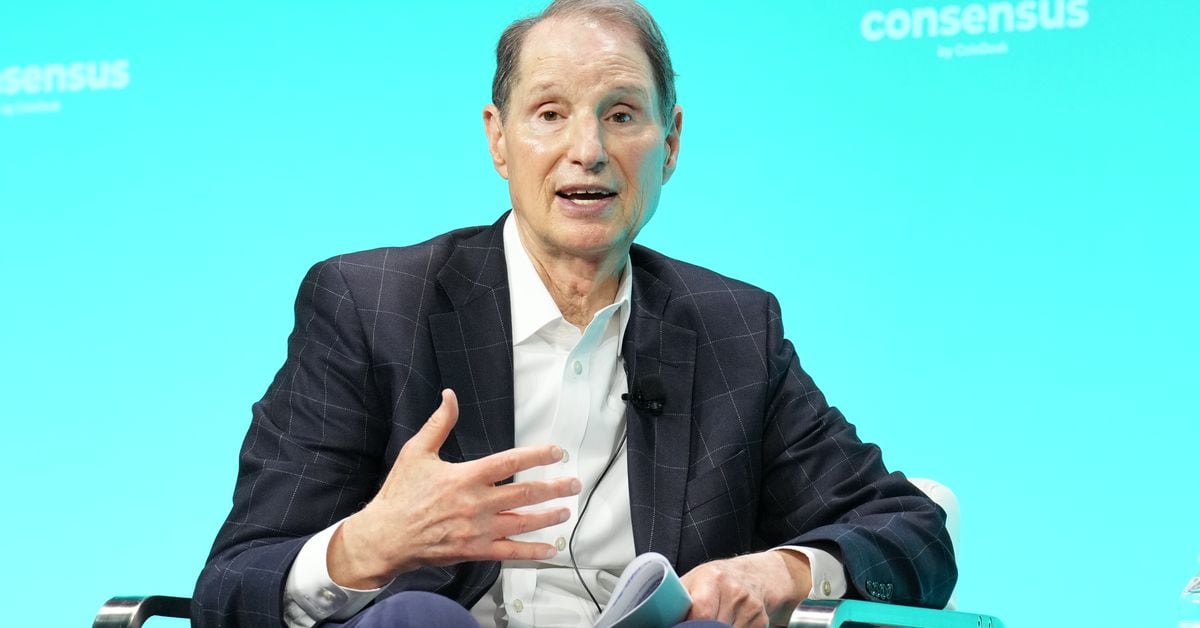News
Ron Wyden on FISA Reform and Crypto

Sen. Ron Wyden (D-Ore.) has been a long-standing member of the U.S. Senate, and was a sponsor or co-sponsor of several key pieces of legislation enabling broad adoption of the internet. More recently, he voted in favor of a House Resolution overturning the Securities and Exchange Commission’s Staff Accounting Bulletin 121, and questioned threats to personal and financial privacy online.
You’re reading State of Crypto, a CoinDesk newsletter looking at the intersection of cryptocurrency and government. Click here to sign up for future editions.
Last month, Sen. Ron Wyden spoke at CoinDesk’s Consensus 2024 conference. As with previous versions of this newsletter, my questions have been shortened but the Senator’s responses. have only been edited lightly.
The Senator has been a key voice in both support of the internet and personal privacy online – two key issues for the crypto industry.
So before we really get into the meat of things, I just want to start with you. How are you here? What are you looking at?
Well, it’s great to get out and learn, and this really goes back to my roots in technology. I showed up in the Senate, when only [former Senator] Pat Leahy (D-Vt.) knew how to use a computer. And I got a chance to write some of the foundational rules of the internet since [Senator Spencer] Abraham (R-Mich.) and I wrote the digital signatures law. I wrote the internet tax non-discrimination law, the law that relates to platforms so that the individual is accountable. And that really kind of sparked my interest in technology policy, which is still the biggest challenge for the Senate – is getting its arms around new technology.
What’s your interpretation of the atmosphere around [crypto] within the Senate? How are lawmakers looking at this?
We’ve made a lot of headway, but there’s a long way to go. And apropos of how I got started on this, as part of the bipartisan infrastructure bill, at the last minute, a group of senators said, “We’re gonna fund this by taxing the software developers and the coders,” and I said, “hey, I don’t know everything about crypto, but these are folks using their First Amendment rights. They’re the creators.”
And by the way, at the top of my priority list is getting more of these creators in the United States of America, because we are losing in many instances to foreign countries. And so when they said, ‘”we’re gonna tax coders to the tune of $50 billion,” I said, “I’d like to know a little bit more about it,” because why are we saying that people who are creative software developers are basically going to do taxing for everybody. And we basically were able to waylay that. And it is kind of symptomatic of what our challenge is. New things come up, and people said, “well, nobody in the Senate knows about it.” And when friends said, they forgot about Ron, and I said, “hold on. I don’t know everything about it. But I know that taxing the software developers without any hearings, without any discussion for $50 billion is a mistake.” And I’m still supporting software developers as a key part of blockchain in our challenge.
A few weeks ago, the Senate passed the Congressional Review Act bill to repeal or overturn the SEC Staff Accounting Bulletin 121. That’s super controversial within the crypto circles, and you were one of the 11 Democrats who helped bring that through the Senate. And could you just speak to how you view this.
Yeah, just to make sure everybody knows what we’re talking about. This is essentially about accounting. So you talk about root canal work, this is like the staff accounting bulletin is what It’s called, it’s not really enforceable. But it basically sets up a different standard for crypto than everybody else has in the financial sector with respect to custody. So this is a pretty complicated thing. And I remember being down on the Senate floor and a lot of senators are going, “huh, what is this? Why didn’t we have any hearings? Why didn’t we have any discussion?” And a lot of us said that before, you’re going to say that crypto doesn’t have the same kinds of custodial arrangements as other financial fields, we ought to have some real discussion about it. And a group of us said, “let’s just hold on here and take the time to make sense and not just establish a whole separate unique barrier to storing customers crypto.”
Do you have any thoughts on – without speaking to a specific bill – is there a need for a market structure bill, legislation addressing this market?
There certainly is and what you really need is a regulatory framework. And that’s what Chairman [Patrick] McHenry is trying to do. And you need to be tough on the scamsters and the rip-off artists, and one of the reasons I wanted to come is I wanted to find out new ways in which particularly blockchain and others are trying to do this.
And I know you all are stepping up your game in terms of fighting terrorism and fraudsters and the cartels and the like, and I think that’s really key. It’s getting late in this session, so it’s unclear how far that bill will move, but I think Chairman McHenry is right to establish a kind of regulatory framework and put a sharper focus on fighting fraud and rip-off artists.
You recently signed a letter alongside Senator Cynthia Lummis of Wyoming kind of questioning the DOJ almost about how they’re interpreting law, and the context of that was, of course, the DOJ is pursuing charges against a developer of Tornado Cash, Roman Storm. Can you speak a little bit to the letter and its contents?
I never talk about specific cases and companies and the facts. But Senator Lummis and I have partnered on a number of bipartisan efforts. And we wanted to make sure that you weren’t painting an entire economic sector with one brush, because you felt that one firm and again, I’m not getting into the facts, was engaged in conduct you’re concerned about. And so, again, we come back to the software developers. People always say, I’m getting repetitive about it, but if you walk out of here with two thoughts: I’m interested in software developers, I’m interested in stable coins. And I think that there’s an opportunity for a lot of creativity. I very much want to see a portable medical record. You’ve had all these politicians and legislators talking about this for literally decades. I think blockchain is capable of doing it. And that’s the kind of story we want to tell.
One of the things you’re perhaps best known for, certainly, alongside the last few months has been your work on reforming FISA, basically a surveillance act. And I’d love to just hear your thoughts on what happened and then where we go from here.
I don’t mind it when people say I’m one of the leading private hawks, privacy hawks in public life. Because, you know, I think people are entitled, law-abiding people are entitled to a zone of privacy. You know, surveillance is one of the most ominous aspects of American life. And what I want to do is make sure in areas like a public policy, like the Foreign Intelligence Surveillance Act, we recognize the trends and the trends are that global communications are more globally integrated, and we ought to protect the privacy rights of Americans swept up in those searches and that’s been a big push of mine with respect to Section 702 of the Foreign Intelligence Surveillance Act.
Do you have any specific – obviously the bill went through, I believe it was just reauthorized without any changes, although–
We already are on our way to some improvements, there are going to be some guardrails in the intelligence authorization bill. But here’s another concern. What we say in the intelligence field is sources and methods. As those patriotic individuals gathered the information about those who might be threats to the country, sources and methods always need to be secret. But the law always needs to be public.
It ought to be possible for Americans to sit at their Starbucks, have a coffee or soda or something, and read a public law, it’s called public for a reason. It gives us a chance to hold elected officials accountable. And unfortunately, the reforms that are being discussed with respect to FISA, a big chunk of that is going to be secret, I call it secret law. And that’s another thought you gotta walk out of here from this discussio, is the sources and methods and intelligence how they gather the information needs to be secret laws need to be public.
What other improvements would you make if you had your way with this bill?
What I have said is that when you’re going to get the information of a law-abiding American, you should have a warrant. And my FISA approach would have established that with an exception, if the government thinks that there’s an imminent threat.
So I see lots of good folks out in the audience. What this means is that the government has to have a warrant, if it is going to get information picked up in these FISA searches about law-abiding Americans. But if there is an imminent threat to folks, for example, here or somewhere else, then the government can go get the information and settle up later.
There’s this question of balancing privacy and the right to do things online, transact, send money around–
Before we pit one of them against the other, let’s make sure that some of us in public life feel that security and liberty aren’t mutually exclusive. We can have both..
So speaking of things that are surveilling us, AI has been pretty in the news recently for everything that’s been going on. I’m just curious if you have any thoughts on, should there be kind of a regulatory framework guiding the development, the data gathering, the building of these new tools? And what might that look like?
I’ve introduced the Algorithm Accountability Act, with Senator [Cory] Booker (D-N.J.), Congresswoman [Yvette] Clarke (D-N.Y.), and my Algorithmic Accountability Act very much resembles some of the things I started on decades ago. There is transparency, there’s accountability, there’s equity, and it’s a smart touch.
I’m not prepared for the government to just create massive layers of government and expense right now, what I want us to do is target in on real problems. I mean, minorities, for example, have huge problems with housing and credit and access to education. That’s what Senator Booker and Congresswoman Clarke and I are going after, we’re going to find out how the algorithms are presented, who’s holding the accountability side of the ledger, and I think that’s a smart way to start.
And by the way, those are my roots, roots with the innovators, the First Amendment folks, and I’m applying it to a lot of fields, I think, I don’t know if you’re gonna get into it, but I’m a strong supporter of stablecoins. I love the name stablecoins, because right away that sends a message that if you peg it to the dollar or something like that you’re serious about, you know, protecting an array of interests.
What’s needed to either you know, either help stablecoins develop in a safe way or is there too much already going on around regulation?
I think we’re just getting started. I mean, look, I heard a rumor that there was an election coming up, and I’m not here to electioneer for one person or another person, we can do that later. But I think I’ve always felt the best politics is good policy. And what we’re talking about with a decentralized approach to finance and competition and strong consumer protection, so you could catch the fraudsters, that’s a great issue for people to run on. And I’m certainly telling my colleagues, that’s, I think, an approach where you do good and do well.
What are just kind of specifics of good policy that, in your view, are lacking right now, around stablecoin development?
Well, the biggest challenge for the Congress is to get its arms around new technology. And the Congress has some people who are sort of traditionalists, and they’re a little bit concerned about competition and choice, they think it’ll lead to disruption. And then there’s a group that don’t know too much about it. And what I think we need to do is find that kind of third path, I always tell my colleagues, if you can find a really good staff person who combines a willingness to learn and an interest in, in the subject, that’s really the coin of the realm in the Senate.
I want to move to the elections a little bit, I have heard that there’s something in November, possibly–
We’re seeing a, I would say almost a “surge of momentum” has been how it’s been described by a lot of the companies and individuals following this, between the votes over the last few weeks, and just some of the other activities. We’re seeing lawmakers and candidates for office really appealing to crypto specifically. Is this a surge of momentum? Will this interest from candidates and lawmakers last beyond November?
We have the potential to really build on the progress we made. Two years ago, I think it’d be fair to say, this was a field that people were not particularly supportive of. And I think now we’re getting to the point where sometime soon, you can have your Thanksgiving dinner, and your grandparents or your parents might be around and they’d say, “tell me about this crypto thing, I’m thinking about putting a little bit of money in it.”
Now, I’m not a financial adviser or anything like that. But I think we now have some opportunities in the kinds of areas that we’re talking about. I mean, think about the software developers, these are the people that folks in politics say they want the most. They’re young, they’re creators, they’re innovative, they’re coming up with, with solutions, in terms of processing, you know, financial assistance to people, bills of lading on paper so outdated, we can use something different for competition and in choice in supply chain. These are great opportunities.
From the voter perspective, are you seeing a lot of voter interest in this issue or constituents reaching out and saying, “this is something I care about?”
I’m getting more questions, I’ve had 1,085 town hall meetings, throw open the doors to my constituents and let them ask questions. Look, this is not getting the same interest as inflation because people feel that they’re getting really hit in the supermarket or health care costs or something else. But there’s no question that there is growing interest here. It’s being driven by a lot of young, creative people.
The blockchain is especially interesting to people in terms of the federal government’s role in money management. I think we’ve got an opportunity to really build interest here. And part of what I’ve told people is, what we need to do is talk about areas like the software developers, we need to make it clear we don’t take a backseat to anybody in terms of fighting fraud. And based on what I’ve been hearing as I go around groups, there are a lot of people in blockchain and crypto who are already involved in working with the government on terrorism fights.
So for our audience viewing physically here and online watching, what would you say is a useful and productive way for them to engage with your office and with your colleagues?
Political change hardly ever starts in Washington, DC and then trickles down, it’s almost always the opposite. It starts at the grass roots and builds upward. What you can do in terms of trying to create more opportunities, particularly for blockchain, is be in contact with your legislators, talk about areas that you think they’ll be interested in, like jobs, jobs are still a big issue in every single meeting I go into. To be able to say these young software developers can do that work in the United States, make a good wage, rather than what we’ve seen where so many of them have gone overseas.
So the power is really in the hands of people here and the people, we’re following this online, I think we’re live streaming. And I’ll just tell you, I look back at my involvement in technology. And I’m so glad that I had that opportunity. And I still believe it’s based on knowing what you don’t know. And that’s really the heart of trying to create good policy, it’s listening. That’s what I did at my town hall meetings over the last week or so, and then going back to DC and talking to a cross section of people, and particularly issues like stable coins, software developers fighting fraud, trying to partner with the government wherever possible in terms of public services, that puts you on the right side of history.
As we begin to wrap up today, I’m just really curious, you know, I want to give you an opportunity, just, you know, what are you watching now? Are there any specific topics and issues, whether it’s in Congress, whether it’s in you know, in Oregon?
At home, the issue that I know, will present as the second word is bill, it might be medical bill, it might be housing bill, it might be gas bill. It’s all about, you know, the challenge, post-COVID, of coming out and finding a way, with lots of industries no longer being here, a path ahead. And that’s why I come back to people like the software developers, those were kind of my roots. That was my first experience with crypto when a bunch of Senators went to the floor and said, “we’re going to sock these developers for $50 billion worth of taxes.” And I said, “wait a minute, how did the software developers suddenly acquire expertise in tax collection,” and we waylaid. So the big challenge of our time is to listen. And I can tell you right now, the supreme supreme opportunity is to focus on these economic issues, and make better use of scarce resources.
I just really want to thank you again, for coming up here. And thank you all for sticking around for the last day [of Consensus].
You know, in DC when you wrap up, somebody always makes a big speech. And sometimes they’re god awful. I’m just going to say thank you. Thank you. Because this is an opportunity to learn and to listen. That’s what I think public policy is supposed to be all about. So we’ll put today’s discussion in the “to be continued” department. Thanks, everybody.
If you’ve got thoughts or questions on what I should discuss next week or any other feedback you’d like to share, feel free to email me at nik@coindesk.com or find me on Twitter @nikhileshde.
You can also join the group conversation on Telegram.
News
Cryptocurrency Price August 1: Bitcoin Dips Below $65K; Solana, XRP Down Up To 8%

Major cryptocurrencies fell in Thursday trading following the Federal Reserve’s decision to keep its key interest rate unchanged. Overnight, the U.S. Federal Reserve kept its key interest rate at 5.25-5.5% for the eighth consecutive time, as expected, while also signaling the possibility of a rate cut at its next meeting in September. The unanimous decision by the Federal Open Market Committee reflects a continued wait-and-see approach as it monitors inflation trends.
CoinSwitch Markets Desk said: “Bitcoin has fallen below $65,000 after the US Federal Reserve announced it would keep interest rates unchanged. However, with markets now anticipating rate cuts at the next Federal Reserve meeting in September, the outlook for a Bitcoin rally by the end of the year has strengthened.”
Meanwhile, CoinDCX research team said: “The crypto market has plunged after the Fed decision. Tomorrow’s US unemployment rate announcement is expected to induce more volatility, with the ‘actual’ figure coming in higher than the ‘expected’ one, which is positive for cryptocurrencies.”
At 12:21 pm IST, Bitcoin (BTC) was down 3.2% at $64,285, while Ethereum was down nearly 4.5% at $3,313. Meanwhile, the global market cryptocurrency The market capitalization fell 3.6% to around $2.3 trillion in the last 24 hours.
“Bitcoin needs to clear its 200-day EMA at $64,510 to consolidate further. Otherwise, a retest of $62,000 could be in the cards,” said Vikram Subburaj, CEO of Giottus.
Altcoins and meme coins, such as BNB (3%), Solana (8%), XRP (5.7%), Dogecoin (5%), Cardano (4.6%), Avalanche (4.3%), Shiba Inu (3.8%), Polkadot (3.4%), and Chainlink (4%) also saw declines.
The volume of all stablecoins is now $71.64 billion, which is 92.19% of the total cryptocurrency market volume in 24 hours, according to data available on CoinMarketCap. Bitcoin’s dominance is currently 54.99%. BTC volume in the last 24 hours increased by 23.3% to $35.7 billion.
(Disclaimer: Recommendations, suggestions, opinions and views provided by experts are personal. They do not represent the views of the Economic Times)
(You can now subscribe to our ETMarkets WhatsApp Channel)
News
Altcoins WIF, BONK, RUNE, JUP Down 10% While Bitcoin Drops 4%

Altcoins dogwifhat, Bonk, THORChain, and Jupiter have suffered losses of more than 10%, while Bitcoin is down 4% in the last 24 hours.
After a period of relative calm yesterday, July 31, Bitcoin (BTC) price action has seen a drastic change as the cryptocurrency dropped by more than $3,500, bringing its value to $63,300. At the same time, altcoins mirrored this trend, with the total value of liquidated positions rising to nearly $225 million over the course of the day.
Initially, the week started on a positive note for Bitcoin, which reached its highest point since early June, hitting $70,000. However, this peak was short-lived, as it was quickly rejected, leading to a substantial decline, with Bitcoin falling below $65,500.
The cryptocurrency managed to regain some stability, trading comfortably at around $66,800. However, following a Press conference According to Federal Reserve Chairman Jerome Powell, the value of Bitcoin has fallen again to $64,300, down more than 3% in 24 hours.
BTC Price Chart 24 Hours | Source: crypto.news
The recession coincided with a relationship from the New York Times stating that Iran had called for retaliatory measures against Israel following the assassination of Hamas leader Ismail Haniyeh in Tehran, increasing the risk of further conflict in the region.
Meanwhile, on the economic front, the Federal Reserve decided to keep its benchmark interest rates in place, offering little information on a planned September rate cut. Powell also hinted that while no concrete decisions have been made on the September adjustment, there is growing consensus that a rate cut is likely.
Amid Bitcoin’s decline, altcoins have suffered even more significant losses. For example, dogwifhat (Wife) saw a 12.4% drop and (DISGUST) has suffered a 10% drop. Other altcoins such as THORChain (RUNE) also fell by 10%, while Jupiter (JUPITER) and the Ethereum naming service (ENS) decreased by 8% and 9% respectively.
Among the largest-cap cryptocurrencies, the biggest losers are Solana (SOL) with a decrease of 8%, (Exchange rate risk) down 6%, Cardano (ADA) down 4%, and both Ethereum (ETH) and Dogecoin (DOGE) recording a decrease of 4.4%.
Data from CoinGlass indicates that approximately 67,000 traders have been negatively impacted by this increased volatility. BTC positions have seen $61.85 million in liquidations, while ETH positions have faced $61 million. In total, the value of liquidated positions stands at $225.4 million at the time of writing.
News
Riot Platforms Sees 52% Drop in Bitcoin Production in Q2

Bitcoin mining firm Riot Platforms has released its second-quarter financial results, highlighting a decline in cryptocurrency mined due to the recent halving.
Colorado-based Bitcoin (BTC) mining company Riot platforms revealed its second quarter financial results, highlighting a significant reduction in mined cryptocurrencies attributed to the recent halving event that took place in early April.
The company reported total revenue of $70 million for the quarter ended July 31, a decline of 8.7% compared to the same period in 2023. Riot Platforms attributed the revenue decline primarily to a $9.7 million decrease in engineering revenue, which was partially mitigated by a $6 million increase in Bitcoin extraction income.
During the quarter, the company mined 844 BTC, representing a decline of over 50% from Q2 2023, citing the halving event and increasing network difficulty as major factors behind the decline. Riot Platforms reported a net loss of $84.4 million, or $0.32 per share, missing Zacks Research forecast a loss of $0.16 per share.
Halving increases competitive pressure
The Colorado-based firm said the average cost of mining one BTC in the second quarter, including energy credits, rose to $25,327, a remarkable 341% increase from $5,734 per BTC in the same quarter of 2023. Despite this significant increase in production costs, the firm remains optimistic about maintaining competitiveness through recent deals.
For example, following the Recent acquisition Cryptocurrency firm Block Mining, Riot has increased its distributed hash rate forecast from 31 EH/s to 36 EH/s by the end of 2024, while also increasing its 2025 forecast from 40 EH/s to 56 EH/s.
Riot Platforms Hashrate Growth Projections by 2027 | Source: Riot Platforms
Commenting on the company’s financials, Riot CEO Jason Les said that despite the halving, the mining company still managed to achieve “significant operational growth and execution of our long-term strategy.”
“Despite this reduction in production available to all Bitcoin miners, Riot reported $70 million in revenue for the quarter and maintained strong gross margins in our core Bitcoin mining business.”
Jason Les
Following its Q2 financial report, Riot Platforms shares fell 1.74% to $10.19, according to Google Finance data. Meanwhile, the American miner continues to chase Canadian rival Bitfarms, recently acquiring an additional 10.2 million BITF shares, increasing its stake in Bitfarms to 15.9%.
As previously reported by crypto.news, Riot was the first announced a $950 million takeover bid for Bitfarms in late May, arguing that Bitfarms’ founders were not acting in the best interests of all shareholders. They said their proposal was rejected by Bitfarms’ board without substantive engagement.
In response, Bitfarms She said that Riot’s offer “significantly understates” its growth prospects. Bitfarms subsequently implemented a shareholder rights plan, also known as a “poison pill,” to protect its strategic review process from hostile takeover attempts.
News
Aave Price Increases Following Whales Accumulation and V3.1 Launch

Decentralized finance protocol Aave is seeing a significant spike in whale activity as the market looks to recover from the recent crash that pushed most altcoins into key support areas earlier this week.
July 31, Lookonchain shared details indicating that the whales had aggressively accumulated Aave (AAVE) over the past two days. According to the data, whales have withdrawn over 58,848 AAVE worth $6.47 million from exchanges during this period.
In one instance, whale address 0x9af4 withdrew 11,185 AAVE worth $1.23 million from Binance. Meanwhile, another address moved 21,619 AAVE worth over $2.38 million from the exchange and deposited the tokens into Aave.
These withdrawals follow a previous transfer of 26,044 AAVE from whale address 0xd7c5, amounting to over $2.83 million withdrawn from Binance.
AAVE price has surged over 7% in the past 24 hours amid buy-side pressure from these whales. The DeFi token is currently trading around $111 after jumping over 18% in the past week.
Recently, the price of AAVE increased by over 8% after Aave founder Marc Zeller announced a proposed fee change aimed at adopting a buyback program for AAVE tokens.
Aave v3.1 is available
The total value locked in the Aave protocol currently stands at around $22 billion. According to DeFiLlamaApproximately $19.9 billion is on Aave V3, while the V2 chain still holds approximately $1.9 billion in TVL and V1 approximately $14.6 million.
Aave Labs announced Previously, Aave V3.1 was made available on all networks with active Aave V3 instances.
V3.1 features improvements that are intended to improve the overall security of the DeFi protocol. The Aave DAO governance has approved the v3.1 improvements, which also include operational efficiency and usability for the network.
Meanwhile, Aave Labs recently outlined a ambitious roadmap for the projectwith a 2030 vision for Aave V4, among other developments.
-

 Regulation12 months ago
Regulation12 months agoRipple CTO and Cardano founder clash over XRP’s regulatory challenges ⋆ ZyCrypto
-

 Regulation10 months ago
Regulation10 months agoNancy Pelosi Considers Supporting Republican Crypto Bill FIT21 – London Business News
-

 Videos11 months ago
Videos11 months agoCryptocurrency News: Bitcoin, ETH ETF, AI Crypto Rally, AKT, TON & MORE!!
-

 Regulation11 months ago
Regulation11 months agoBitcoin’s future is ‘bleak’ and ripe for regulation, says lead developer
-

 News8 months ago
News8 months agoAave Price Increases Following Whales Accumulation and V3.1 Launch
-

 Regulation8 months ago
Regulation8 months agoSouth Korea Imposes New ‘Monitoring’ Fees on Cryptocurrency Exchanges
-

 Regulation8 months ago
Regulation8 months agoA Blank Sheet for Cryptocurrencies: Kamala Harris’ Regulatory Opportunity
-

 Regulation8 months ago
Regulation8 months agoCryptocurrency Regulations in Slovenia 2024
-

 News11 months ago
News11 months agoThe trader earned $46 million with PEPE after reaching a new ATH
-

 Regulation11 months ago
Regulation11 months agoCrypto needs regulation to thrive: Tyler Cowen
-

 Blockchain11 months ago
Blockchain11 months agoSolana ranks the fastest blockchain in the world, surpassing Ethereum, Polygon ⋆ ZyCrypto
-

 Blockchain11 months ago
Blockchain11 months agoSolana Surpasses Ethereum and Polygon as the Fastest Blockchain ⋆ ZyCrypto

















